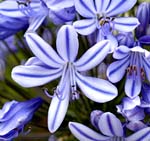How to banish slugs naturally
Some garden plants are a nightmare for slugs: we find out the most useful natural deterrents


If you want to buy any of the plants mentioned below for your own
garden, visit www.countrylife.co.uk/nursery and type or copy and paste
the name into the search. Plants are delivered in sturdy boxes in a
matter of days from one of the finest nurseries in the country.
A small amendment to the Oxford English Dictionary may be in order. So far as gardeners are concerned, sluggish now means ‘energetic, adventurous, irrepressible'. Similarly, a snail's pace now describes a progression so swift, unpredictable and all-pervasive that only the chaps at CERN could measure it. Arriving after a decade of pest-friendly gardening, this year's rain has resulted in a perfect storm of slugs and snails.
The population has tripled, bolstered by a boom in the Spanish slug Arion flagellus and the eastward encroachment of our native Arion ater, a species more often associated with the damp West. Both are giants, up to 5in long, and in fetching shades of soiled khaki, bilious orange, fag-ash grey and sump-oil black. Both dare to devour plants usually declared slug-proof, such as old-fashioned pinks, culinary sage and Achillea.
Although these monsters are large enough to slice with secateurs, you will only diminish their numbers slightly-and your appetite completely. They'll laugh at broken eggshells and sharp grit, two traditional slug-discouragers, as will their smaller cousins in weather as wet as this year's. One old trick that does work is luring them to death by drowning in a beer-filled sunken trap. It's the carbohydrate they like, not the booze, so there's no point in giving them one for the road with anything labelled premium extra-dry. Added salt will deliver the coup de grâce and dissolve their bodies. My favourite slugbear, freshly ground coffee (not dregs, not decaff), has held up well as a mulch for high-risk candidates such as hostas.
Sign up for the Country Life Newsletter
Exquisite houses, the beauty of Nature, and how to get the most from your life, straight to your inbox.
Barrier methods are becoming popular-copper wires, gels, granules, that sort of thing; so is Nemaslug, a microscopic nematode worm, which, when watered into the soil, parasitises slugs but not other creatures. For especially vulnerable plants, however, pellets remain the only sure protection. Used locally and sensibly, they're not necessarily an affront to the environment, and the RHS website offers excellent guidance on these matters. Let's hope people heed it: in early July, one major garden-centre chain reported a 74% increase in pellet sales-drastic measures for drastic times.
But none of these strategies is smarter than Nature's own defences. Exploit those, and it becomes possible to create a beautiful garden that gives slugs and snails next to no sustenance. Ferns and ornamental grasses spurn them with near-total success. Between these two richly varied categories of perennials, there's no reason why the garden in shade or sun shouldn't seem furnished to a high finish. Grasses repel boarders by offering them an unpalatably high-fibre diet. Other perennials that do the same include Yucca filamentosa, Crocosmia, Ophiopogon and certain irises.
With ferns, it's chiefly hairiness that confers immunity. Similarly safe are many flowering plants with bristly or woolly leaves, among them Alchemilla, Geum, Heuchera, Papaver orientale, Pulmonaria, Salvia argentea and Verbascum varieties. Although some slugs clearly have a death wish (or a gut of steel), most are wary of the Plant Kingdom's black widows, the beautiful poisoners such as Aconitum carmichaelii and herbaceous peonies. Often, they will also turn up their noses at aromatic foliage, shunning members of the mint family such as Agastache Blue Fortune and shrubby semi-tender sages such as Salvia elegans, and bushy, silver-pelted and chrysanthemum-scented members of the daisy family such as Santolina.
These are not promises, merely proven probabilities: as a rule, these plants and others like them will be slug-proof. Even so, there may be times of danger. New growth may be vulnerable, and especially when delayed by a dry, early spring and then unleashed over weeks of mollusc-mollycoddling monsoon. That's why our hellebores and astrantias, usually trouble-free, are less than perfect this year. Not so the plants here-these can slug it out with the worst of them, Spanish marauders included.
to Country Life and save £1 per issue
Country Life is unlike any other magazine: the only glossy weekly on the newsstand and the only magazine that has been guest-edited by HRH The King not once, but twice. It is a celebration of modern rural life and all its diverse joys and pleasures — that was first published in Queen Victoria's Diamond Jubilee year. Our eclectic mixture of witty and informative content — from the most up-to-date property news and commentary and a coveted glimpse inside some of the UK's best houses and gardens, to gardening, the arts and interior design, written by experts in their field — still cannot be found in print or online, anywhere else.
-
 A rare opportunity to own a family home on Vanbrugh Terrace, one of London's finest streets
A rare opportunity to own a family home on Vanbrugh Terrace, one of London's finest streetsThis six-bedroom Victorian home sits right on the start line of the London Marathon, with easy access to Blackheath and Greenwich Park.
By James Fisher
-
 Materials, textures, construction, expression: A Brutalist watch on your wrist
Materials, textures, construction, expression: A Brutalist watch on your wristLuxury watchmakers are seeking to bridge the gap between two contrasting styles, with exciting results.
By Chris Hall